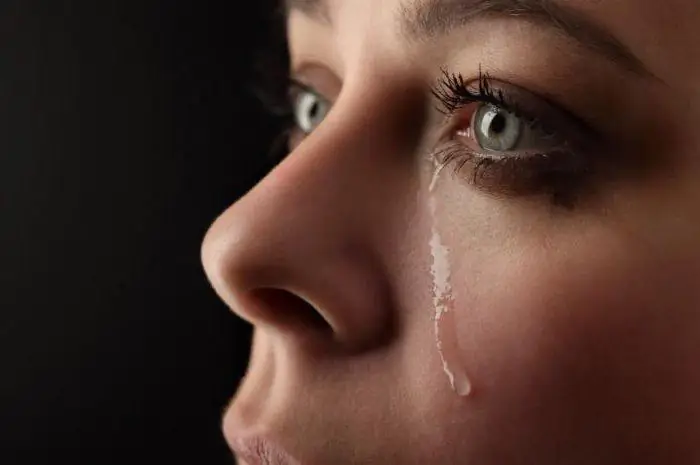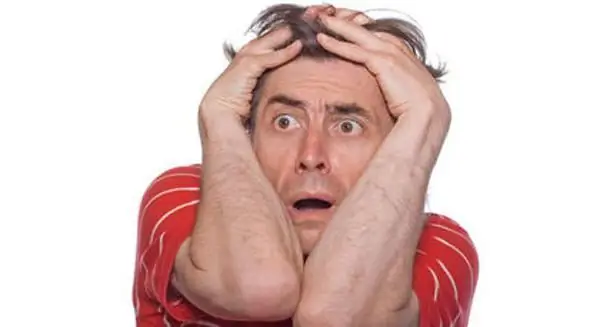- Author Curtis Blomfield blomfield@medicinehelpful.com.
- Public 2023-12-16 20:44.
- Last modified 2025-01-23 17:01.
Doctors call a reactive state a disorder that occurs as a response of the body to the impact of an adverse factor. This term is used in both somatic medicine and psychiatry. Harmful conditions can cause both disruption of the internal organs (liver, pancreas), and damage to mental he alth. In the first case, the cause of deviations is bodily ailments, and in the second - serious mental trauma. Such pathologies are usually temporary. Next, the main types of negative reactions from the organs and systems of the body (liver, pancreas and psyche), as well as the causes, symptoms and treatment of these disorders will be considered.
What is reactive hepatitis
The reactive state of the liver occurs in the form of hepatitis. However, in this case, the pathology is not caused by a virus, but by diseases of other organs. This is an answer fromliver for harmful effects. Reactive hepatitis is milder and has a better prognosis than infectious lesions. The disease does not progress. Symptoms are mild, and sometimes the disorder proceeds without painful manifestations and is detected only during a medical examination. Deviations in the activity of liver enzymes and the level of bilirubin are insignificant. If the cause of the reactive state of the liver is cured, then all violations are completely stopped.
Causes of reactive hepatitis
This disease is always secondary. The following pathologies can provoke its development:
- gastrointestinal ailments: ulcerative processes, inflammation of the pancreas, nonspecific colitis;
- autoimmune rheumatic disorders: systemic lupus erythematosus, scleroderma, rheumatoid arthritis, dermatomyositis, rheumatism, periarthritis nodosa;
- endocrine system disorders: diabetes mellitus, hypo- and hyperthyroidism;
- burns of a large area of the body;
- infectious diseases;
- malignant tumors;
- surgical interventions;
- poisoning;
- long-term use of hepatotoxic drugs.
The pathological process most often affects only the parenchymal tissue and is reversible.
Reactive hepatitis is more common in adults. This is due to the fact that children are less likely to suffer from chronic diseases. But if the child still has this pathology, then it proceeds with severe symptoms. In children, the cause of reactive liver changes is more oftenall become diseases of the digestive tract, as well as helminthic invasion.
Symptoms and treatment of reactive hepatitis
In adulthood, the reactive state is often asymptomatic, making diagnosis difficult. The following discomforts are sometimes observed:
- general malaise;
- feeling tired;
- subfebrile temperature;
- weakness;
- discomfort and pain under the ribs on the right side;
- slightly yellowish skin tone.

The patient does not always associate these signs with impaired liver function. It is very important to identify these deviations in time. During a medical examination, slight pain is possible when probing. The liver is slightly enlarged. Assign a blood test for biochemistry. The results of the study determined a slight increase in bilirubin, liver enzymes and a decrease in protein. It is important to separate reactive inflammation from viral hepatitis. To do this, conduct blood tests for the presence of infection.
With timely treatment, the reactive state has a favorable outcome. All violations are functional. For successful therapy, it is necessary to find out the cause of the disorders that have arisen and cure the underlying disease. In addition, hepatoprotectors are prescribed, the patient is recommended to follow a sparing diet. If the pathology is caused by poisoning or long-term use of hepatotoxic drugs, then enterosorbents must be taken.
This condition is not dangerous, but delay in going to the doctor andself-medication is unacceptable. Without therapy, disorders can become persistent and complicate the course of existing diseases.
What is reactive pancreatitis
The pancreas is closely related to the digestive system. Therefore, many pathologies of the gastrointestinal tract negatively affect the work of this organ. The gland produces pancreatic juice, which then mixes with bile and enters the intestine through the ducts. However, various diseases disrupt this process, and then a reactive condition of the pancreas (reactive pancreatitis) occurs.
Enzymes of pancreatic juice begin to work after entering the intestine. In the pancreas, they are in an inactive form. Special intestinal fluids put these enzymes into action. This is how the digestive process works in a he althy person. But with diseases of the gastrointestinal tract, intestinal fluid can be thrown into the bile ducts. In this case, the pancreatic juice becomes active, being in the pancreas, and the enzymes begin to negatively affect this endocrine organ. Inflammation occurs - reactive pancreatitis.

Causes of reactive pathology of the pancreas
Provoking factors in the development of a reactive state of the pancreas are the following diseases and disorders:
- pathologies of the stomach and intestines: gastritis, peptic ulcer, gastroduodenitis, infections and injuries of the digestive system;
- liver disease: gallstones, cirrhosis, biliary dyskinesia;
- surgery on the gastrointestinal tract and gallbladder;
- autoimmune pathological processes;
- poisoning;
- alcohol abuse;
- insufficient and malnutrition.
In children, this disease often develops as a complication of ascariasis. With a strong invasion, helminths clog the bile ducts, which leads to congestion and inflammation of the pancreas.
Symptoms and treatment of reactive pancreatitis
Symptoms of reactive inflammation of the pancreas are usually pronounced. At the initial stage, the patient has the following symptoms:
- There is severe pain in the abdomen and under the ribs, discomfort increases after eating.
- Vomiting often with no relief.
- The patient suffers from heartburn and belching.
- In the intestines, an increased amount of gases is formed, bloating is determined.
- Diarrhea occurs up to several times a day.
Then comes a strong intoxication of the body. The patient's skin turns pale, the limbs become cold, heart palpitations appear, and blood pressure drops. The general condition is rapidly deteriorating. In severe forms of reactive pancreatitis, immediate hospitalization is required.

The clinical picture also depends on the cause of the pathology. If the reactive state has arisen due to diseases of the liver and gallbladder, then patients complain of pain in the solar plexus. If pancreatitis was provokedlesions of the gastrointestinal tract, then discomfort is localized in the upper abdomen.
Symptoms of the reactive state of the pancreas in a child has its own characteristics. In addition to the above manifestations, children have a high temperature, plaque on the tongue, dry mouth, diarrhea is replaced by constipation. In the blood test, the level of sugar rises. In infancy, the disease often occurs without pronounced symptoms, but lethargy and decreased appetite in infants can be noticed.
Diagnosis of the disease is carried out using ultrasound. In this case, not only the pancreas is examined, but also all the digestive organs. This is necessary to establish the cause of reactive inflammation. In addition, a urine test for pancreatic enzymes, a blood test for leukocytes and ESR, as well as endoscopy of the duodenum are prescribed.
The main disease that caused reactive pancreatitis is being treated. They also prescribe anti-inflammatory drugs, analgesics and antispasmodics. This helps relieve pain. Need a diet with limited spicy and fatty foods.
Reactive pancreatitis has a favorable prognosis. Timely therapy leads to complete recovery. If untreated, the inflammatory process can become chronic, in addition, patients often have an increase in blood sugar levels.
Reactive mental disorders
In psychiatry, reactive states are temporary mental disorders that develop after emotional upheavals. Violations are reversible and disappearafter treatment. Such a pathology can occur in any person after difficult experiences, for example, after the death or serious illness of a loved one, family breakup and other sad events. However, an unfavorable and protracted course of these disorders is observed in people suffering from psychopathy or vascular diseases.

Reactive states are the body's response to psychic trauma. There are two main subspecies of such disorders:
- reactive neuroses;
- reactive psychoses.
Neurosis usually occurs during a long traumatic situation. Psychoses appear as a reaction to acute emotional experiences and stress.
The following forms of reactive states of a neurotic nature can be distinguished:
- neurasthenia;
- compulsive disorder;
- hysteria.
There are also several types of reactive psychoses:
- depression of psychogenic etiology;
- paranoid disorders;
- psychogenic hallucinosis;
- puerilism;
- delusional fantasies;
- stupor;
- "running wild" syndrome;
- imaginary dementia.
The symptoms of such disorders are always pronounced. The duration of the course of reactive mental disorders depends on the presence of concomitant vascular pathologies and the type of patient's personality. In vulnerable people with a fine mental organization, as well as in patients with atherosclerosis, such disorders can continue for a long time.
Symptomsreactive mental disorders
The clinical picture of reactive disorders is extremely diverse. Symptoms of the disease depend on the form of the disorder.
It is necessary to consider the main symptoms observed in various forms of psychogenic neurotic states:
- Neurasthenia. The patient is mentally and physically exhausted. The patient gets tired easily, feels constant fatigue, headaches, sleep is sharply disturbed. Decreased performance. The person becomes excitable, irritable, anxious. At the same time, the mood is constantly lowered.
- Obsessional neurosis. Such a deviation after a psychotrauma is observed infrequently. The patient constantly performs the same actions, for example, counting objects or touching them. Sometimes a person makes different movements. For the patient, this takes on the character of protective rituals. Disturbed by obsessive thoughts, memories, fears that arise against the will of the patient.
- Hysteria. There is a strong crying with screams and motor excitation. In some cases, a person cannot stand and walk with a completely he althy musculoskeletal system. These phenomena are accompanied by vegetative disorders: sensation of a lump in the throat, suffocation, nausea.

Reactive psychosis has more severe disorders:
- Psychogenic depression. Patients experience a persistent decrease in mood. The severity of this symptom can vary from mild depression to severe depression. Oftenpatients blame themselves, for example, for the death and illness of a loved one. Movement and facial expressions are sharply inhibited.
- Paranoid disorders. Against the background of a dreary mood and increased anxiety, delusions of persecution or external influence arise. Patients become fearful, restless or aggressive. The content of delusional ideas is usually associated with psychotrauma.
- Psychogenic hallucinosis. The patient has auditory hallucinations. He hears voices discussing him. In this case, the patient feels intense fear. Optical deceptions are possible when the patient takes the surrounding objects for people. The content of hallucinations is related to the stress experienced.
- Puerilism. The patient imitates the behavior of a small child. Patients talk with a child's voice, act up, cry.
- Delirium-like fantasies. The patient periodically has ideas of greatness or imaginary we alth. Unlike paranoid delusions, these disturbances are not persistent and permanent. One idea quickly replaces another. With treatment, fantasies disappear.
- Stupor. The patient becomes extremely lethargic, stops moving, eating and talking.
- Syndrome "wild". This type of reactive mental state is extremely rare. In the behavior of the patient, features characteristic of the habits of animals are noted. Patients moo, bark, crawl on all fours, become aggressive.
- Imaginary dementia. There are signs of dementia. Patients have impaired memory, they cannot give the correct answer to simple questions or perform habitual actions. However, unlikefrom true dementia, this condition is easily cured and has a good prognosis.

Diagnosis of reactive psychoses is often difficult. These conditions must be distinguished from schizophrenia and bipolar disorder. The psychiatrist should conduct a conversation with the patient and his relatives to identify the presence of a stressful situation. Chronic mental illnesses develop independently of psychotrauma, and reactive disorders are always the result of moral upheavals.
Reactive mental disorders in childhood
A reactive state in children occurs after suffering fright and other traumatic factors. It is most often observed in infancy and preschool age. There are two types of reactions of the child's psyche to trauma. The child either becomes restless (rushing about, crying, screaming), or freezes in place and stops talking. This is accompanied by vegetative disorders: sweating, redness of the skin, tremors, involuntary urination and defecation.
Then the child becomes lethargic, whiny, he is disturbed by fears. Behavioral patterns may appear that are characteristic of younger children. For example, a child of 5-6 years old begins to behave like a baby of 1.5 years old. Reactive mental states in children require immediate treatment. All changes are reversible.

Therapy for Reactive Mental Disorders
Sedative drugs are used in the treatment of neurotic disorders. If the symptoms are mild, then you can prescribe herbal remedies (valerian, motherwort) or the medicine "Afobazol". For more severe disorders, tranquilizers are indicated. Not only medicines are used, but also psychotherapeutic methods.
Treatment of reactive psychosis is more challenging. In a dreary mood with ideas of self-blame, antidepressants are used. If the patient has delusions and hallucinations of psychogenic origin, then neuroleptics and sedatives are used.
Forensic medical examination for reactive mental disorders
In the forensic psychiatric assessment of reactive states, the form of the disorder should be taken into account. With neuroses, patients are usually recognized as sane. They may be held responsible for wrongdoing.
As for reactive psychoses, it is necessary to take into account the degree of their severity. With mild violations, a person usually gives an account of his actions. In severe delusional disorders and hallucinations, the patient may be declared insane. It is also important to remember that depressed patients with ideas of self-blame often slander themselves and sometimes confess to wrongs they did not commit.
Acute reactive states with delusions and hallucinations are considered as mental pathologies that are temporary. During the period of painful manifestations, a person may be recognized as incapacitated. In this case, all civil acts (transactions, wills, etc.) committed by him during a mental disorder are invalidated.






